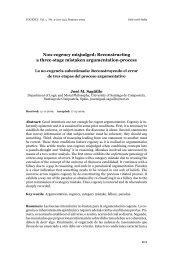Cogency v2 n2
Cogency v2 n2
Cogency v2 n2
You also want an ePaper? Increase the reach of your titles
YUMPU automatically turns print PDFs into web optimized ePapers that Google loves.
Wittgenstein’s influence on the development of informal logic / R. H. JOHNSON<br />
suggestion, but that is all it really is–a suggestion. There are no references<br />
to Wittgenstein in that important chapter, though the idea of a working logic<br />
that Toulmin is presenting here does appear to be in keeping with what I<br />
have called the spirit of the later Wittgenstein.<br />
My conclusion, then, is that the influence of Wittgenstein on Toulmin’s<br />
The Uses of Argument is much less than often supposed. This is not to say<br />
that elsewhere in Toulmin’s works, we would not find that influence. (See<br />
Godden 2003, p.370.)<br />
Hamblin’s Fallacies (1970)<br />
I don’t think there is much doubt that one of the formative works in the<br />
development of informal logic was Hamblin’s Fallacies. His critique of the<br />
traditional textbook treatment of fallacy hit home for many and laid the<br />
groundwork for a new generation of scholarship on the fallacies. The research<br />
project on fallacies carried out by Woods and Walton in the 70s and<br />
80s (Woods and Walton, 2006) can be seen as an attempt to meet the challenge<br />
laid down by Hamblin in this work.<br />
It may be surprising to some to learn that Hamblin was quite strongly<br />
influenced by Wittgenstein; “surprising,” because in Fallacies, there are just<br />
four references to Wittgenstein’s works– to the Tractatus twice (p. 95, p.<br />
301) and then the Brown Book (BB) and to the PI. I would infer from this<br />
information that Hamblin had read those works which in the 1960s was<br />
most of what had been published under Wittgenstein’s name. The question<br />
of what influence the later Wittgenstein exerted on Hamblin in general and<br />
on Fallacies in particular is harder to answer, 15 though we may tease out<br />
something of a tentative answer by looking at the references on p.242 and<br />
p.285.<br />
On p. 242, n.1, Hamblin refers to the “well-known private language argument<br />
in Philosophical Investigations, 258, which can be adapted here.”<br />
Hamblin is probably referring to the famous “Diary of ‘S’ example”–where<br />
an individual is asked to keep track of the occurrence of a sensation “S”<br />
15<br />
J. M. Mackenzie who studied with Hamblin reports that Hamblin took himself to be a<br />
Wittgensteinian.<br />
97








